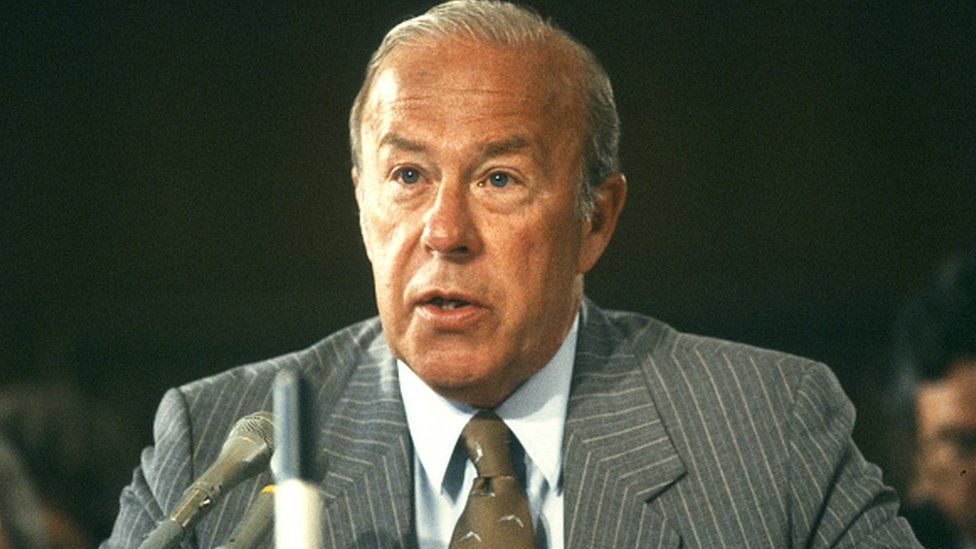George Shultz: US secretary of state who helped end Cold War dies
- Published

George Shultz sought to improve US relations with the Soviet Union under President Ronald Reagan
George Shultz, a former US secretary of state who significantly shaped foreign policy in the late 20th Century, has died at the age of 100.
He died on Saturday at his home in Stanford, California, the Hoover Institution think tank said.
He served three Republican presidents - Dwight Eisenhower, Richard Nixon and Ronald Reagan - in various roles.
Under Mr Reagan, Mr Schultz spent much of the 1980s trying to improve relations with the Soviet Union.
The Hoover Institution, where Mr Schultz worked as a distinguished fellow, said the statesman had been instrumental "in changing the direction of history by using the tools of diplomacy to bring the Cold War to an end".
Hoover Institution Director Condoleezza Rice - a former secretary of state herself - said: "Our colleague was a great American statesman and a true patriot in every sense of the word."
"He will be remembered in history as a man who made the world a better place."
Mr Shultz held various positions in the governments of presidents Nixon and Reagan
Who was George Shultz?
Born in New York City in 1920, Mr Shultz studied economics before serving in the US Marine Corps during World War II.
In the 1950s he held senior academic posts and worked in the Eisenhower administration as economic adviser. When Republicans returned to the White House with Richard Nixon in 1969, Mr Shultz was appointed secretary of labor.
He later became Mr Nixon's secretary of the treasury and chairman of the Council on Economic Policy.
In 1982, Ronald Reagan made Mr Shultz his secretary of state. In the Reagan White House, notorious for infighting, Mr Shultz was one of the least controversial figures, cultivating ties with allies and enemies.
In the second half of the 1980s, Mr Shultz courted then-Soviet leader Mikhail Gorbachev to try to ease Cold War tensions.
By 1987 Mr Reagan and Mr Gorbachev signed a landmark arms control agreement, the Intermediate-Range Nuclear Forces Treaty. A few years later, the Soviet Union collapsed.
Mr Schultz reached out to Mr Gorbachev at a time when US-Soviet relations were sour
Mr Schultz also was involved in talks with Iran in the 1980s. In an interview with the BBC in 2013, the diplomat suggested Iran was "a tough customer" to deal with.
The Iranians are good at "smiling, encouraging you on and then cutting your throat", he said.
Former US Secretary of State George P Shultz warns Iran is "a tough customer" to deal with
Last December Mr Shultz celebrated his 100th birthday.
In an opinion piece for the Washington Post, external to mark the occasion, Mr Shultz reflected on the lessons he had learned over his life in politics.
"Trust is the coin of the realm," he wrote. "When trust was in the room, whatever room that was - the family room, the schoolroom, the locker room, the office room, the government room or the military room - good things happened. When trust was not in the room, good things did not happen."
Related Topics
- Published4 November 2019
- Published13 December 2016